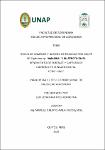Dosis de compost y número de estacas por golpe de Erythrina sp. "amasisa" y du efecto en el rendimiento de forraje y captura de carbono en Zungarococha, Perú - 2021
Abstract
The National University of Amazonia with its Faculty of Agronomy in the humid tropics, develops potentialities in forage food research and the present work is titled DOSE OF COMPOSTY NUMBER OF STAKES PER HIT OF Erythrina sp. "AMASISA" AND ITS EFFECT ON FORAGE YIELD AND CARBON CAPTURE IN ZUNGAROCOCHA, PERU - 2021. The present work has a completely randomized block design with a factorial arrangement of 2 x 2 and experimental units with an area of 5 m x 1.2 m (6m2), presenting the treatments T1(Erythrina 1 stake + 10 t of compost), T2(Erythrina 1 stake + 20 t of compost), T3(Erythrina 2 stake + 10 t of compost) and T1(Erythrina 2 stake + 20 t of compost), where N1: One stake of Erythrina sp., N2: Two stakes of Erythrina sp, F1: 10 t of bovine manure compost/ha and F2: 20 t of bovine manure compost/ha. There is interaction with respect to the dependent variables of carbon and carbon dioxide. With the N2F2 treatment (2 stakes + 20 tons of compost/hectare) an average of 3.82 kilos of green matter/m2 was achieved, of dry matter of 0.82 kilos/m2 in yield of green matter/plot of 22.91 and yield of green matter per hectare of 38,183 tons. With the treatment T2 (N1F2), T4 (N2F2) and T3 (N2F1), which are statistically equal in the carbon indicator with 3.665, 3.608 and 3.3329 tons per hectare. carbon dioxide with 13,449, 13,242 and 12,218 tons per hectare. La Universidad Nacional de la Amazonia con su facultad de Agronomía en el trópico húmedo, desarrolla potencialidades en la investigación de alimento forrajero y el presente trabajo lleva como títuloDOSIS DE COMPOSTY NÚMERO DE ESTACAS POR GOLPE DE Erythrina sp. “AMASISA” Y SU EFECTO EN EL RENDIMIENTO DE FORRAJE Y CAPTURA DE CARBONO EN ZUNGAROCOCHA, PERÚ – 2021. El presente trabajo tiene un deseño de bloque completamente al azar con arreglo factorial de 2 x 2 y unas unidades experimentales de área de 5 m x 1.2 m (6m2), presentando lo tratamientos T1(Erythrina 1 estaca + 10 t de compost), T2(Erythrina 1 estaca + 20 t de compost), T3(Erythrina 2 estaca + 10 t de compost) y T1(Erytrhina 2 estaca + 20 t de compost), donde N1: Una estaca de Erythrina sp., N2: Dos estacas de Erythrina sp, F1: 10 t de compost de estiércol de bovino/ha y F2: 20 t de compost de estiércol de bovino/ha. Hay interacción en lo que respecta a las variables dependientes de carbono y dióxido de carbono. Con el tratamiento N2F2 (2 estacas + 20 toneladas de compost/hectárea) se logró un promedio de 3.82 kilos de materia verde /m2, de materia seca de 0.82 kilos/m2 en rendimiento de materia verde/parcela de 22.91 y rendimiento de materia verde por hectárea de 38.183 toneladas. Con el tratamiento T2 (N1F2), T4 (N2F2) y T3 (N2F1), que son estadísticamente iguales en el indicador de carbono con 3.665, 3.608 y 3.3329 toneladas por hectárea. dióxido de carbono con 13.449, 13.242 y 12.218 toneladas por hectárea.
Collections
- Tesis [670]


